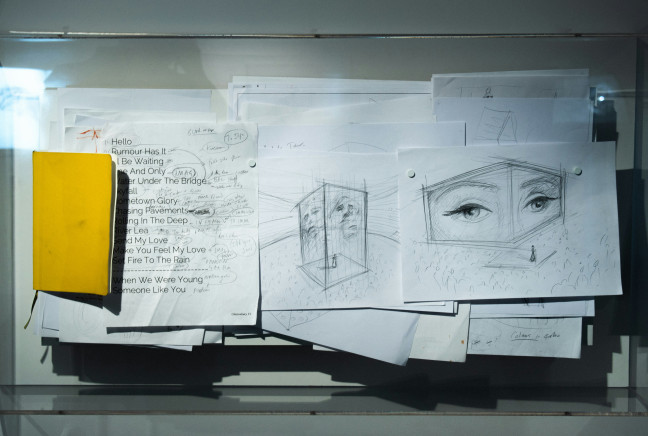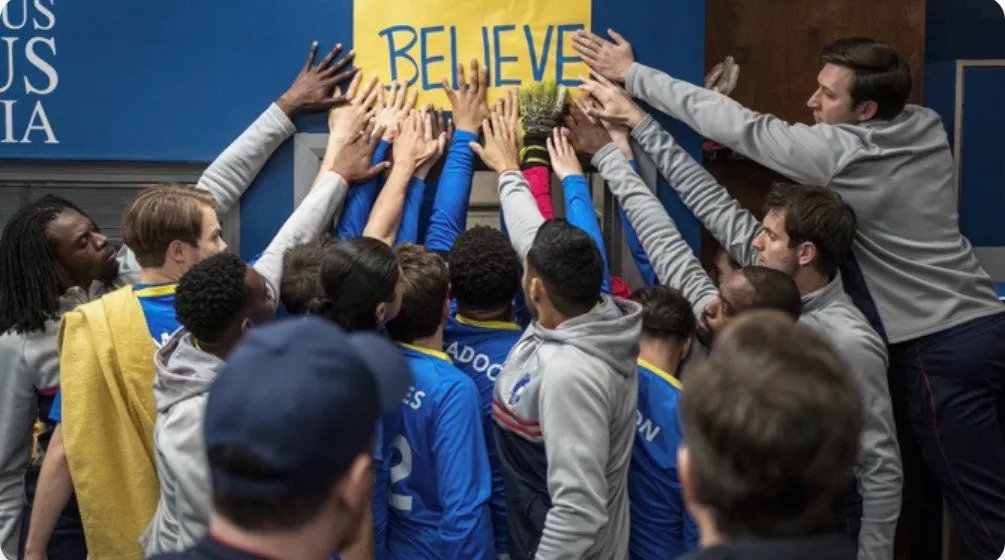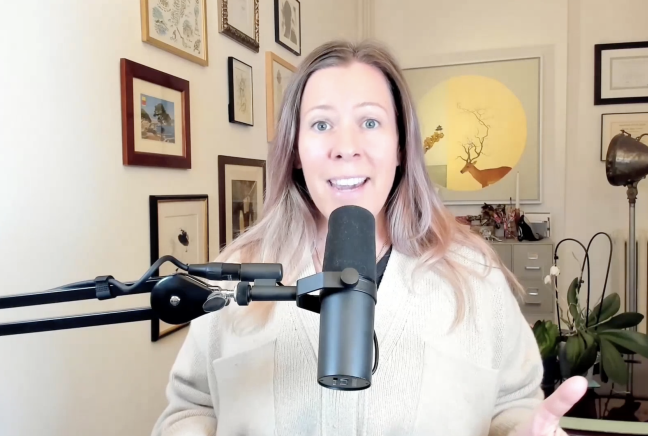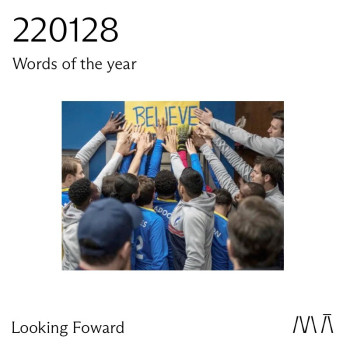
I wasn't going to do the 2016 trend
While cleaning my living room for an event, I picked up a notebook. Instead of putting it …
Consider making an intention for the year by choosing a single word. I think of it as a guiding light, a place to focus my attention in the distance helping me on my path - especially useful when things are a bit dark. Discover my word and consider finding your own.

Collectivism. That’s a word to watch, according to the Future Laboratory, the London-based trend forecasting agency whose Future Forecast 2022 I read through last week.
What does it mean?
The definition of collectivism (according to Wikipedia) is a value that is characterized by emphasis on cohesiveness among individuals and prioritization of the group over the self.
Now in the context of the presentation of their findings, the word is linked to the importance of groups and communities, which are predicted to become ever more prevalent in the metaverse. Future Lab co-founder Martin Raymond told us he had a hunch, and I think he is probably onto something. After all, previous podcast guest Yancey Strickler was forecasting a ‘post-individualist’ era when I interviewed him a few months ago.
WORDS WITH FRIENDS
Talking about words, my friend Isa is a writer and a bit of a polymath, like me, meaning she has several strings to her professional bow.
Last year, Isa and I had a nice long leisurely chat, over the course of which she brought up the fact that she chooses a word of the year, every year. How far back this dates, I'm not sure, but how fun, I thought to myself. What a clever way to direct your focus, your attitude, for the coming months, like putting forward an intention for who we want to be, what we want to achieve, or how we want to show up in our lives.
I put a mental pin in it but as 2022 rocked around, I had forgotten about it. I have to thank Tara Parker-Pope, the editor of Well, at the New York Times, for putting this back on the map for me, thanks to this article. In it, Ms Parker-Pope invites us, as Isa had suggested, to choose a word for our year, and perhaps even share it with her via an online form. For someone like me, fond of self-reflection and intention setting, this felt like a great idea, and of course, I went ahead and did it.
PURPOSE, INTENT, ATTITUDE AND THE RIGHT BRAIN
Intention setting is something that I was introduced to by a number of yoga teachers I studied under. They regularly asked their students to consider setting an intention at the start of their practice. These same teachers often theme the classes after a specific value, whether it be, awareness, kindness, caring, openness, flexibility. These were all entry ways for me into how intention could affect attitude, and of course later on, actions, whether on or off the mat.
Thanks to them, I learned that with intentionality we can open ourselves up for a different kind of result, particularly when we want to influence change.
So I became intentional about intention, and I’ve been cultivating it personally and professionally more and more every year. Surprisingly, this showed up outside of the confines of my yoga practice and/or my office when my tennis instructor, Virginia, told me pointedly in our first lesson last summer that ‘intention informs action’.
I must have looked at her funny because I stopped in my tracks as I considered her words. The intention towards the ball is a form of gathering focus. Where attention goes, energy flows. Huh. Applicable to life then, I reflected to her out loud.
Not surprisingly, my interest peaked when I heard Harvard neuroanatomist and famed TED speaker Jill Bolte-Taylor discuss intention in this podcast interview. She explained how intention works, at the level of the brain, siding with Virginia:
“Intention is a direction. [...] Intention is not everywhere in the brain, [...] it is a group of cells in the right hemisphere of the brain. And a lot of people don’t have intention, they are not running that right brain circuitry [...] they are just flopping around like fish in the sea, right? They don’t know they’re heading somewhere.”
Indeed, running around on the court without having a clear intention, I could see her point. I feel a bit bad writing that, because that sounds like what I did for a large part of my life. Does that resonate with you?
HOPE AND INTENTION
Isn’t it a shame we don't put this kind of topic on the school curriculum? Choosing a direction through intention is such an effective way to map a path for ourselves, and in doing so, to connect with our inner motivation. Because to find your intention, you first need to go inward, and decide what it is that you want for yourself. We’re not taught that either - to figure out what we want - and that’s a real mistake both at individual and business level.
Apart from seeking sales, higher margins or profits, how many companies do you know of who have positive intentions towards their employees, their clients, and the wider world - and I mean genuine intentions, beyond the stuff that is slapped on a website, pretending to have a mission or a vision.
Coming back to that word of the year, I believe words can be a fast-lane or gateway to our future.
Perhaps not designing our future, but colouring it thanks to that word, a chosen lens. Cultivating intention affects our attitude towards the type of goals we choose, the way we handle projects, and, of course, how we communicate with people. And guess what, it affects our results too.
AND MY WORD IS…
I won’t try to make you guess, this isn’t Wordle (although I considered it!). The first word that came up was VALUE. Surprised? It was tied to business value, self-worth, choosing what we value doing, valuing oneself, etc. As it happens, it turned out a lot in 2021 for me, so perhaps it was underlying my year even though I wasn’t aware of it.
The right word popped up right behind, as it had jumped at me before, during a coaching session I had last year. My coach had asked me to project into the future of my business and I felt on a roll I as told her all the things I hope to build. And just as I was about to use the word growth, I stopped.
I poked around in my vocabulary to see if I could find something more organic, softer in some way, and I found FLOURISH. And that felt great.
More than ‘growth’, it feels connected to another part of nature’s cycle. Flourishing is something we experience regularly in our lives, our gardens, etc. It reminded me of my conversation with my friend and podcast guest Paolo Ferrarini, when we approached the subject of content, strategy and what other metrics of success we could consider in a ‘post-growth world’. I quoted Tony Robbins who often says ‘if we don’t grow, we die.’ And Paolo offered this:
‘You know what? I come from the countryside, I'm a country boy and I know seasons. And if you know seasons, you know that for something to grow, something has to die. So growth is constant, not necessarily growth is exponential.
So growth is every spring, every summer you have incredible growth, but then you have to see things die and you have to store stuff and you have to get ready for storms or a bad season.
Of course, growth is constant. It can be constant, but not never ending.’
At times we feel like everything is barren, sullen, quiet. Winter can feel daunting and these many pandemic months (years!) feel like an extended form of a cold, slow hibernation (at least here they do).
I choose FLOURISH as my word because I have been active, in my way, during these slower months: I've worked on what matters, matters to me, and planted seeds. Now it’s time to patiently nurture them, perhaps, or hopefully, watch them grow and flourish.
INTENTION IS STRATEGY
And while this word-connection with nature was the reason that brought me to revisit our chat with Paolo, I realised this passage below was also the point I am trying to make about intention, because he beautifully articulated:
‘It's not philosophy. This is strategy. And it has to come from something that is truly, deeply in the DNA of the company. [...] But if companies, founders, the CEOs, whoever is in charge of defining the big strategies, if they don't understand themselves, what's their true core, they can make stuff, but they don't make a difference. They don't make history.’
So this is me making the case for cultivating intention, choosing a word of the year, and again, making a difference.
YOUR TURN
I invite you to have a try, perhaps bring this to work, talk about it with colleagues, team, your boss even, and choose a word. Do send me your words; I’d love to hear them.
And if you want to take inspiration from someone other than Isa, myself or Tara Parker-Pope, I give you Ted Lasso (for those not yet Lasso fans, see the image at the top of the post). Maybe do what he did, write your word on a big piece of paper, stick it above the door, on the mirror or somewhere in plain view, and maybe connect with it each time you pass it.
And if you want to make a difference, or even history, or if you’re stuck with intention or strategy, you know where to find me.
Until next week.

While cleaning my living room for an event, I picked up a notebook. Instead of putting it …

Some of my friends have found my business model a little strange. Podcasting at the heart …

I bought a new face cleanser, and that's big news. Not because of the product itself, but …
